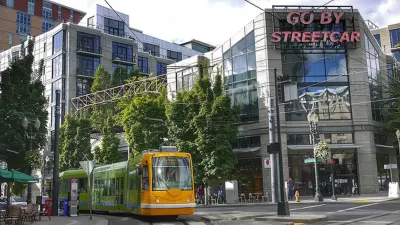Michael Andersen reports on the evolving Powell-Division Transit and Development Project, recently revealed to fall short of its intended goal to speed up bus service in the planning area.

"A $200 million project to improve bus service and change zoning through Southeast Portland and Gresham is in limbo after project managers realized that it wouldn’t actually make it faster to ride the bus," reports Michael Andersen.
Powell-Division Transit and Development Project will now be up for revisions by the regional transit agency Metro. A January article by Andersen argued that the proposal's lack of a dedicated bus lane on 82nd Avenue meant "the proposed 'bus rapid transit' would actually travel more slowly there in 2035 than the #72 bus does today."
Andersen reports that some of the impetus for sending the project back to the drawing board is a desire to qualify for matching grants from the federal Small Starts program. Andersen also describes in detail each of the six alternative options that Metro will consider for the project as a result of this change of direction.
FULL STORY: ‘Rapid’ bus plan on Powell-Division stalls after it turns out not to be rapid

Maui's Vacation Rental Debate Turns Ugly
Verbal attacks, misinformation campaigns and fistfights plague a high-stakes debate to convert thousands of vacation rentals into long-term housing.

Planetizen Federal Action Tracker
A weekly monitor of how Trump’s orders and actions are impacting planners and planning in America.

In Urban Planning, AI Prompting Could be the New Design Thinking
Creativity has long been key to great urban design. What if we see AI as our new creative partner?

King County Supportive Housing Program Offers Hope for Unhoused Residents
The county is taking a ‘Housing First’ approach that prioritizes getting people into housing, then offering wraparound supportive services.

Researchers Use AI to Get Clearer Picture of US Housing
Analysts are using artificial intelligence to supercharge their research by allowing them to comb through data faster. Though these AI tools can be error prone, they save time and housing researchers are optimistic about the future.

Making Shared Micromobility More Inclusive
Cities and shared mobility system operators can do more to include people with disabilities in planning and operations, per a new report.
Urban Design for Planners 1: Software Tools
This six-course series explores essential urban design concepts using open source software and equips planners with the tools they need to participate fully in the urban design process.
Planning for Universal Design
Learn the tools for implementing Universal Design in planning regulations.
planning NEXT
Appalachian Highlands Housing Partners
Mpact (founded as Rail~Volution)
City of Camden Redevelopment Agency
City of Astoria
City of Portland
City of Laramie




























